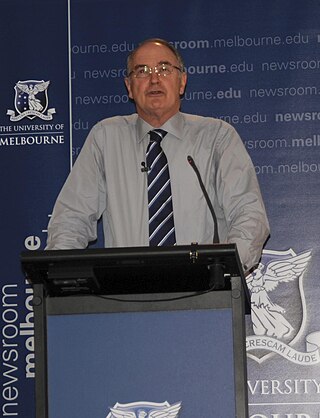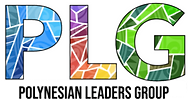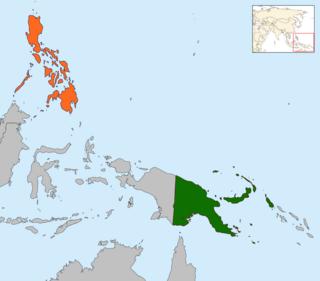Related Research Articles

Papua New Guinea is a country in Oceania that comprises the eastern half of the island of New Guinea and offshore islands in Melanesia, a region of the southwestern Pacific Ocean north of Australia. It has a land border with Indonesia to the west and neighbours Australia to the south and the Solomon Islands to the east. Its capital, on its southern coast, is Port Moresby. The country is the world's third largest island country, with an area of 462,840 km2 (178,700 sq mi).

The United Nations Economic and Social Council (ECOSOC) is one of the six principal organs of the United Nations, responsible for coordinating the economic and social fields of the organization, specifically in regards to the fifteen specialized agencies, the eight functional commissions, and the five regional commissions under its jurisdiction.

Port Moresby, also referred to as Pom City or simply Moresby, is the capital and largest city of Papua New Guinea. It is one of the largest cities in the southwestern Pacific outside of Australia and New Zealand. It is located on the shores of the Gulf of Papua, on the south-western coast of the Papuan Peninsula of the island of New Guinea. The city emerged as a trade centre in the second half of the 19th century. During World War II, it was a prime objective for conquest by the Imperial Japanese forces during 1942–43 as a staging point and air base to cut off Australia from Southeast Asia and the Americas. Due to its population and outsized influence compared to other cities in Papua New Guinea, Port Moresby may be regarded as a primate city.

The Association of Southeast Asian Nations, commonly abbreviated as ASEAN, is a political and economic union of 10 states in Southeast Asia. Together, its member states represent a population of more than 600 million people and land area of over 4.5 million km2 (1.7 million sq mi). The bloc generated a purchasing power parity (PPP) gross domestic product (GDP) of around US$10.2 trillion in 2022, constituting approximately 6.5% of global GDP (PPP). ASEAN member states include some of the fastest growing economies in the world, and the institution plays an integral role in East Asian regionalism.

Asia-Pacific Economic Cooperation is an inter-governmental forum for 21 member economies in the Pacific Rim that promotes free trade throughout the Asia-Pacific region. Following the success of ASEAN's series of post-ministerial conferences launched in the mid-1980s, APEC started in 1989, in response to the growing interdependence of Asia-Pacific economies and the advent of regional trade blocs in other parts of the world; it aimed to establish new markets for agricultural products and raw materials beyond Europe. Headquartered in Singapore, APEC is recognized as one of the highest-level multilateral blocs and oldest forums in the Asia-Pacific region, and exerts significant global influence.

Papua New Guinea's foreign policy reflects close ties with Australia and other traditional allies and cooperative relations with neighboring countries. Its views on international political and economic issues are generally moderate.

The Pacific Islands Forum (PIF) is an inter-governmental organisation that aims to enhance cooperation among countries and territories of Oceania, including formation of a trade bloc and regional peacekeeping operations. It was founded in 1971 as the South Pacific Forum (SPF), and changed its name in 1999 to "Pacific Islands Forum", so as to be more inclusive of the Forum's Oceania-spanning membership of both north and south Pacific island countries, including Australia.
The standard of living in India varies from state to state. In 2021, extreme poverty was reduced to 0.8% and India is no longer the nation with the largest population living in poverty.

Kitimat is a district municipality in the North Coast region of British Columbia, Canada. It is a member municipality of the Regional District of Kitimat–Stikine regional government. The Kitimat Valley is part of the most populous urban district in northwest British Columbia, which includes Terrace to the north along the Skeena River Valley. The city was planned and built by the Aluminum Company of Canada (Alcan) during the 1950s. Its post office was approved on 6 June 1952.

The London Plan is the statutory spatial development strategy for the Greater London area in the United Kingdom that is written by the Mayor of London and published by the Greater London Authority. It is updated from time to time.

John Bernard Hayes is a former New Zealand politician and diplomat. A member of the National Party, he was a Member of the New Zealand House of Representatives in the Wairarapa electorate from 2005 to 2014.

Sir Michael Thomas Somare was a Papua New Guinean politician. Widely called the "father of the nation", he was the first Prime Minister after independence. At the time of his death, Somare was also the longest-serving prime minister, having been in office for 17 years over three separate terms: from 1975 to 1980; from 1982 to 1985; and from 2002 to 2011. His political career spanned from 1968 until his retirement in 2017. Besides serving as PM, he was minister of foreign affairs, leader of the opposition and governor of East Sepik Province.

Ross Gregory Garnaut is an Australian economist, currently serving as a vice-chancellor's fellow and professorial fellow of economics at the University of Melbourne. He is the author of numerous publications in scholarly journals on international economics, public finance and economic development, particularly in relation to East Asia and the Southwest Pacific.
The Pacific Agreement on Closer Economic Relations (PACER) is an umbrella agreement between members of the Pacific Islands Forum which provides a framework for the future development of trade cooperation.
Gregory Lawrence Urwin PSM CSI was an Australian career diplomat and top Pacific specialist. Urwin held the post of Secretary General of the Pacific Islands Forum, an important inter-governmental regional organisation from 2004 until 2 May 2008. Urwin had been the longest serving Australian diplomat in the Pacific at the time of his death in 2008. Urwin was also the first non-Pacific Islander to become Secretary General of the Pacific Islands Forum.

Henry Tuakeu Puna is a Cook Islands politician. He most recently served as the secretary-general of the Pacific Islands Forum from May of 2021 to 2024. He was Prime Minister of the Cook Islands from November 2010 to October 2020. Since 2006 he has been leader of the Cook Islands Party.

The Polynesian Leaders Group (PLG) is an international governmental cooperation group bringing together four independent countries and eight self-governing territories in Polynesia.

The Pacific Institute of Public Policy (PiPP) is an independent, non-profit, regionally focused think tank based in Port Vila, Vanuatu. The stated aim of PiPP is to stimulate and support informed policy debate in the Pacific. A central feature of PiPP's model of engagement with policy stakeholders is the distribution of research via several media including: research syntheses, discussion papers, forums, public debates, social networking, audio and video podcasts, press, radio and television. PiPP was established on November 21, 2007, under the Vanuatu Charitable Associations (Incorporation) Act [CAP.140]. PiPP covers policy issues across the following Pacific Island Countries: Cook Islands, Federated States of Micronesia, Fiji, Kiribati, Marshall Islands, Nauru, Niue, Palau, Papua New Guinea, Samoa, Solomon Islands, Tonga, Tuvalu, Vanuatu

The Development Policy Centre (Devpol) is an aid and development policy think tank based at the Crawford School of Public Policy in the College of Asia and the Pacific at the Australian National University. Devpol undertakes independent research and promotes practical initiatives to improve the effectiveness of Australian aid, to support the development of Papua New Guinea and the Pacific Islands region, and to contribute to better global development policy.

Papua New Guinea–Philippines relations are the bilateral relations of Papua New Guinea and the Philippines. Papua New Guinea has an embassy in Manila and the Philippines has an embassy in Port Moresby, which is also accredited to the Solomon Islands, Vanuatu and Fiji.
References
- ↑ Maggie Tait (27 October 2005). "Pacific leaders agree to regional plan". New Zealand Herald. Retrieved 2 March 2021.
- ↑ "Port Moresby Statement of 6th Pacific Civil Forum". Scoop. 3 November 2005. Retrieved 2 March 2021.
- ↑ "Pacific Plan Review Report available to Public". Scoop. 20 December 2013. Retrieved 2 March 2021.
- ↑ "Leaders keen to make Pacific Plan work". RNZ. 6 May 2014. Retrieved 2 March 2021.